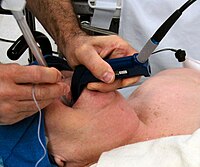
Photo from wikipedia
INTRODUCTION Airway management, including endotracheal intubation, is one of the cornerstones of care of critically ill patients. Internationally, health professionals from varying backgrounds deliver endotracheal intubation as part of their… Click to show full abstract
INTRODUCTION Airway management, including endotracheal intubation, is one of the cornerstones of care of critically ill patients. Internationally, health professionals from varying backgrounds deliver endotracheal intubation as part of their critical care role. This article considers the development of airway management skills within a single advanced critical care practitioner (ACCP) team and uses case series data to analyse the safety profile in performing this aspect of critical care. Skills were acquired during and after the ACCP training pathway. A combination of theoretical teaching, theatre experience, simulation and work-based practice was used. Case series data of all critical care intubations by ACCPs were collected. Audit results: Data collection identified 675 intubations carried out by ACCPs, 589 of those being supervised, non-cardiac arrest intubations requiring drugs. First pass success was achieved in 89.6% of cases. A second intubator was required in 4.3% of cases. Some form of complication was experienced by 42.3% of patients; however, the threshold for complications was set at a low level. CONCLUSIONS This ACCP service developed a process to acquire advanced airway management skills including endotracheal intubation. Under medical supervision, ACCPs delivered advanced airway management achieving a first pass success rate of 89.6%, which compares favourably with both international and national success rates. Although complications were experienced in 48.3% of patients, when similar complication cut-offs are compared with published data, ACCPs also matched favourably.
Journal Title: British journal of nursing
Year Published: 2022
Link to full text (if available)
Share on Social Media: Sign Up to like & get
recommendations!